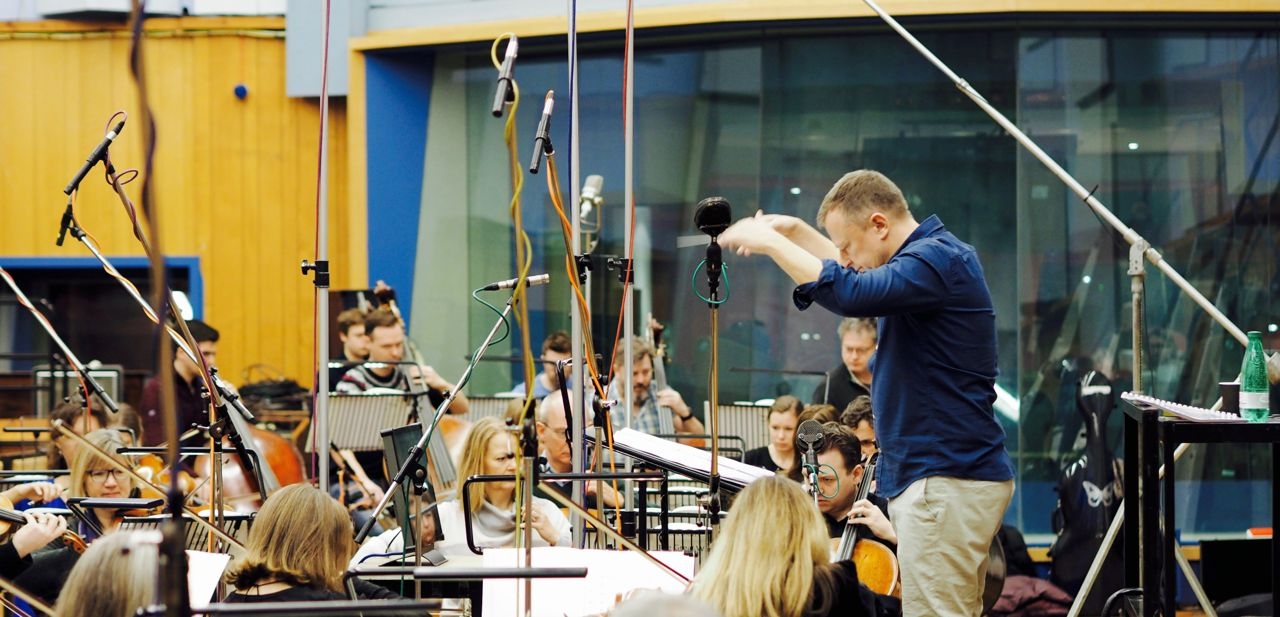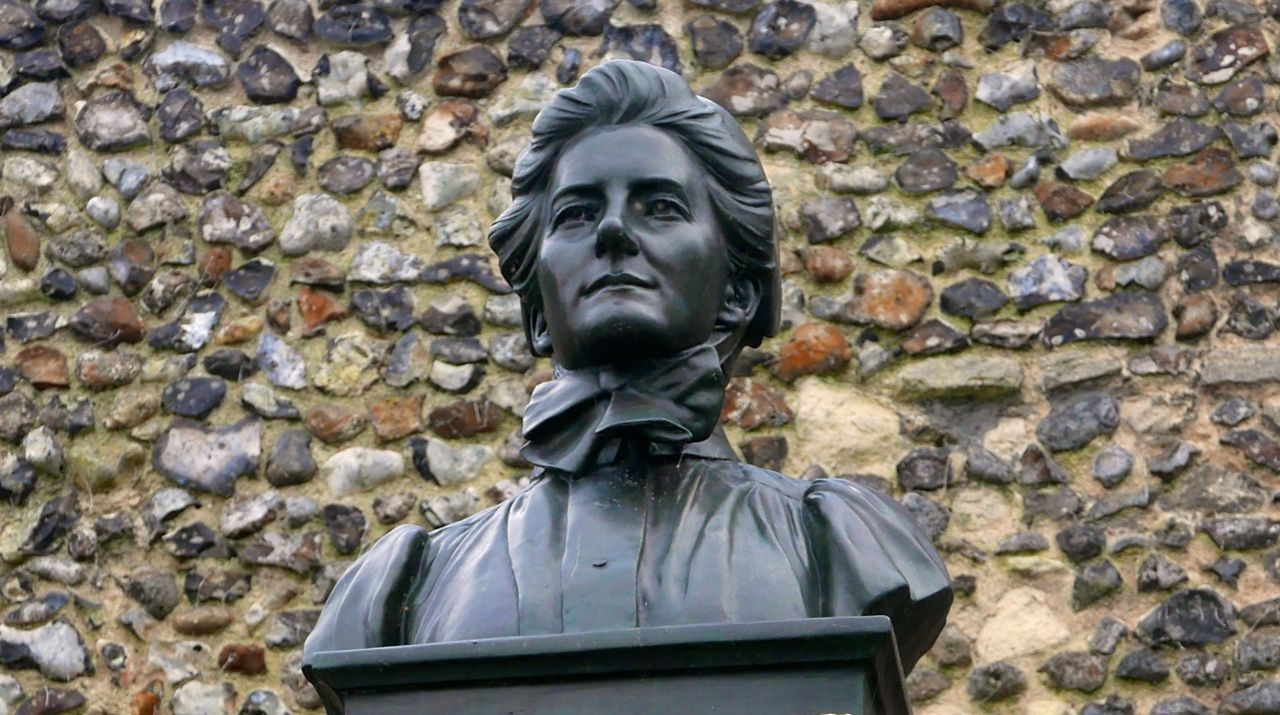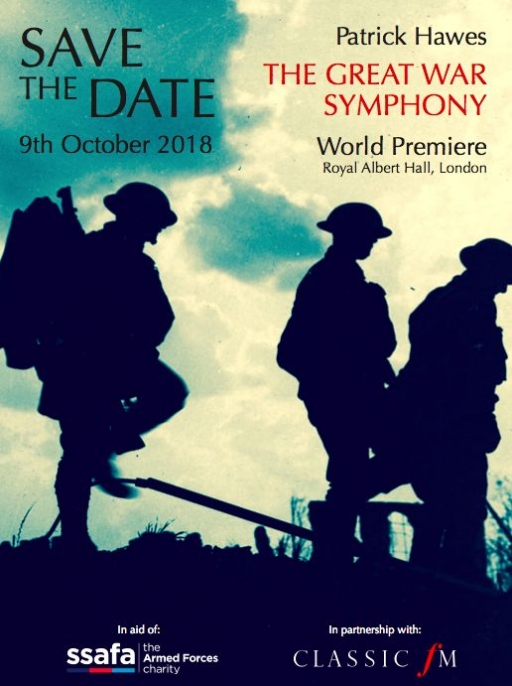Centenary News has listened in to recording of The Great War Symphony’ – a new choral work specially written for this year’s closing WW1 commemorations by the British composer, Patrick Hawes.
Dedicated ‘as a monument in music’ to all those who gave their gives in 1914-18, the symphony will receive its world première at London’s Royal Albert Hall on October 9.
And on the centenary of the Armistice itself, November 11, singers are being invited to take part in the first US performance at another of the world’s great music venues, Carnegie Hall in New York.
Before the live concerts comes the release of the recorded album in September.
Patrick Hawes has drawn on the First World War experiences of his own forebears, and the words of war poets both well-known and less familiar, for a work that brings together the combined forces of the Royal Philharmonic Orchestra, youth choirs and military bands.
A great uncle, Harry Hawes, was killed during the Battle of the Somme in 1916, and some of the composer’s earliest musical memories are of his grandfather, a former soldier partially deafened by gunfire, singing It’s a Long Way to Tipperary and Mademeoiselle from Armentières. Both will be referenced in The Great War Symphony.
The war has already featured in Patrick Hawes’ repertoire. Eventide – his choral tribute to Edith Cavell, the British nurse executed in German-occupied Belgium in 1915 – was premiered at her final resting place, Norwich Cathedral, for the start of the Centenary in July 2014. The composer has also explored the legend of the Angels of Mons and an unfinished poem by Wilfred Owen, I Know the Music.
 Patrick Hawes conducting the Royal Philharmonic Orchestra at Abbey Road Studios in London (Photo © Tony Simpson)
Patrick Hawes conducting the Royal Philharmonic Orchestra at Abbey Road Studios in London (Photo © Tony Simpson)
Centenary News caught up with the orchestra and composer in Studio One at Abbey Road as they started recording the symphony’s opening movement with soloist Joshua Ellicott – the tenor’s voice representing the ‘fighting man away from home.’ He’ll be joined by soprano Louise Alder, representing the women on the home front as well as those who witnessed events first hand.
At first hearing the sound is quintessentially English, a blend of wistful and rousing. Hawes speaks of his own homage to Elgar. In the gloom of early January, this was an enticing overture to the final Centenary year.
There are four movements, each reflecting a year of the First World War, opening with a sense of foreboding represented through the chimes of Big Ben and words from Wilfred Owen’s poem 1914….’and now the Winter of the world With perishing great darkness closes in.’
The second movement brings in Gallipoli and Jutland, building up to the crescendo of the Battle of the Somme. Sorrow, loss and love are all felt in the next movement, Elegy, the deadlock of 1916-17 when there seemed no end in sight to the bloodshed.
Patrick Hawes promises an ‘upbeat note’ to conclude the symphony, using the words of the American poet, Moina Michael, who was herself inspired to adopt the poppy as a symbol of remembrance in November 1918 by John McCrae’s In Flanders Fields. Her poem We Shall Keep the Faith includes the line…. ‘Fear not that ye have died for naught; We’ll teach the lesson that ye wrought in Flanders Fields.’
The Great War Symphony is Patrick Hawes’ biggest work to date: “I feel that I’ve created four individual movements, but they do hang together,” he says. “Mahler once said that the symphony is a world. I hope I’ve distilled the world of (the Great War) into a symphonic genre.”
 Patrick Hawes’ previous work has included ‘Eventide: In Memoriam Edith Cavell’, a tribute to the nurse executed in Brussels in 1915 (Photo: Centenary News)
Patrick Hawes’ previous work has included ‘Eventide: In Memoriam Edith Cavell’, a tribute to the nurse executed in Brussels in 1915 (Photo: Centenary News)
Listen to Patrick Hawes talking about ‘The Great War Symphony’ in a series of video logs on his website. As well as commemorating those who fell in 1914-18, the symphony will also promote the current work of the UK armed services families’ charity SSAFA. The concert première in London on October 9 will be broadcast by the radio station Classic FM, where Patrick Hawes is a former composer-in-residence.
Images courtesy of Patrick Hawes Music/Tony Simpson; Centenary News (Edith Cavell Memorial at Norwich Cathedral)
Posted by: CN Editor
